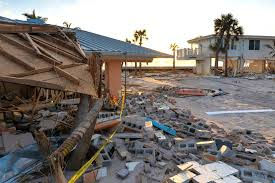“America Unprepared as Extreme Weather Threat Grows”
- Admin
- Jul 6, 2025
- 2 min read

As natural disasters intensify across the United States, a leading climate scientist has sounded the alarm: the nation is dangerously unprepared for the worsening impacts of climate change.
Kristina Dahl, Vice President for Science at Climate Central, an independent climate research organization, says extreme rainfall events like the recent Central Texas floods are becoming more frequent and severe a trend being felt not only in the U.S. but across the globe.
Extreme Rainfall on the Rise
According to Dahl, Central Texas has witnessed a 20% increase in rainfall intensity during the heaviest storms since 1970, with similar patterns observed in other parts of the country and the world.
“As our climate warms, the atmosphere is able to hold more moisture,” Dahl explained in an interview with CNN’s Lynda Kinkade. “This increases the likelihood of extreme downpours in shorter periods, leading to catastrophic flooding events.”
The Human Cost of Unpreparedness
The devastating flooding in Texas, which has claimed lives and displaced families, highlights a deeper issue: America’s lack of readiness for climate-driven disasters.
“The tragic loss of life underscores how unprepared we are as a nation, not just for today’s disasters, but for the larger-scale events that are coming as the planet continues to warm,” Dahl emphasized.
The Role of Warming Oceans
One key factor amplifying recent storms, according to Dahl, is the unusually warm surface temperatures in the Gulf of Mexico. This warmth fuels moisture-heavy storm systems capable of releasing extraordinary amounts of rain in a short time.
“This very warm, wet air is a major reason why central Texas experienced such devastating rainfall,” Dahl said.
Funding Cuts Threaten Disaster Preparedness
Adding to the challenge, budget cuts to vital agencies like the Federal Emergency Management Agency (FEMA) and the National Oceanic and Atmospheric Administration (NOAA) risk undermining both emergency response and accurate weather forecasting.
“These organizations provide round-the-clock monitoring and forecasting that help keep communities safe,” Dahl warned. “Without them, predicting where the heaviest rain will fall and how that translates into flooding becomes even more difficult. These are incredibly complex scientific challenges that require resources and expertise.”
A Call for Urgent Action
The growing frequency of extreme weather events hurricanes, floods, wildfires, and heatwaves signals the need for stronger disaster preparedness, improved forecasting systems, and decisive climate action.
“We must invest in science, infrastructure, and emergency response if we are to protect lives and communities from the escalating risks of climate change,” Dahl urged.
Key Takeaways:
Central Texas and other regions are experiencing more intense rainfall due to climate change.
The nation is ill-prepared for large-scale disasters linked to global warming.
Funding cuts to FEMA and NOAA could weaken disaster forecasting and response.
Urgent investment in climate resilience and scientific research is needed.
👉 Action Point: Governments, businesses, and individuals must work together to enhance disaster preparedness, support climate science, and reduce greenhouse gas emissions to safeguard communities for the future.









Comments